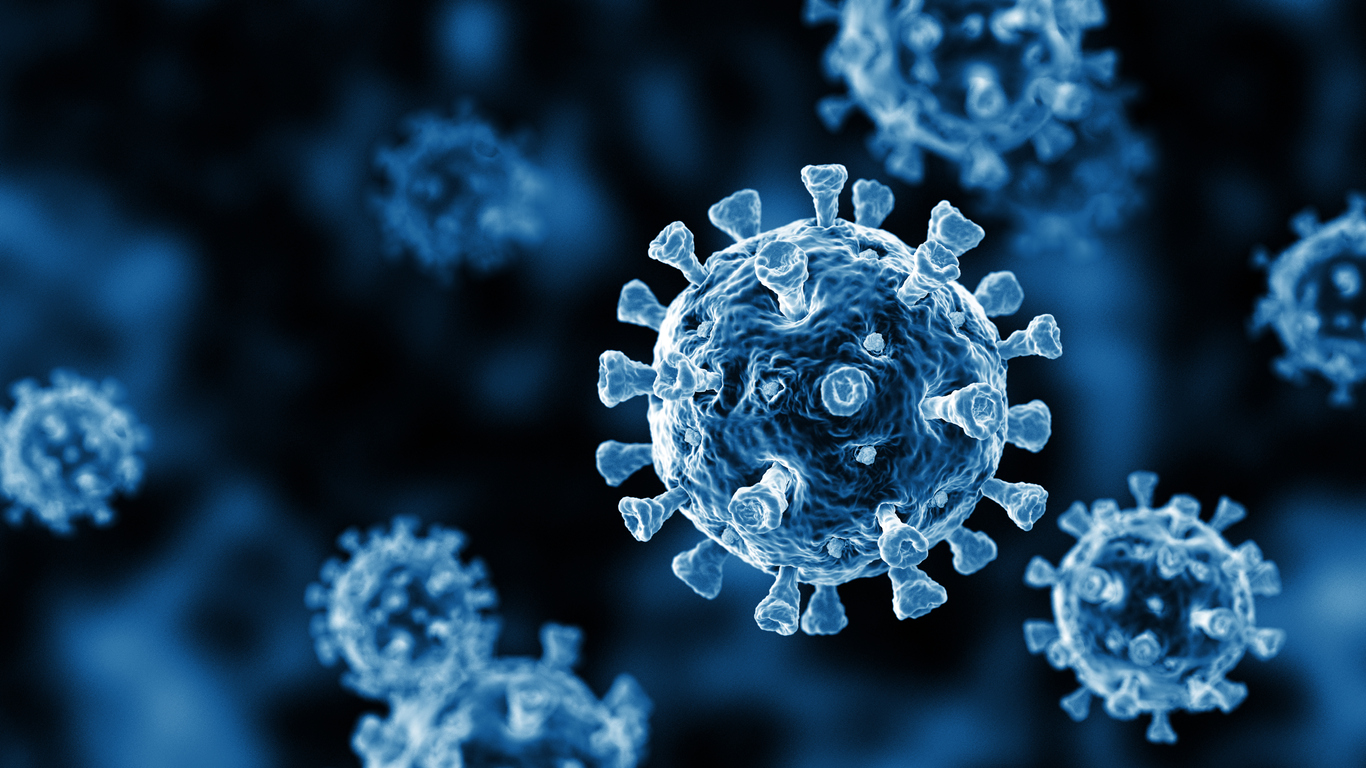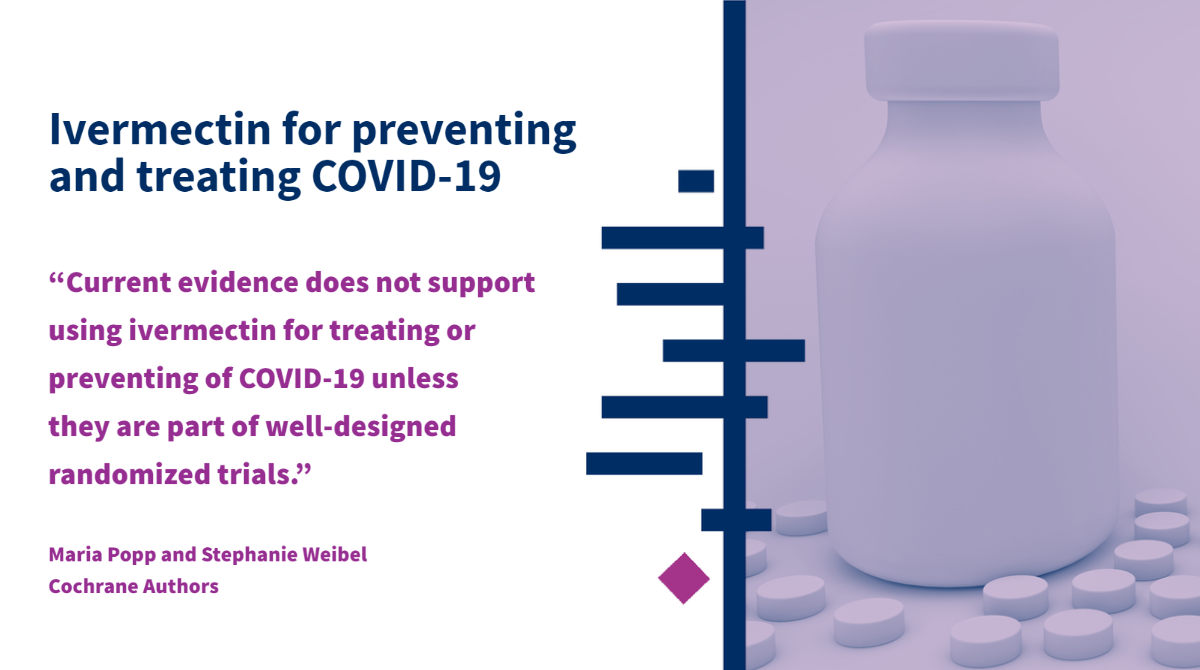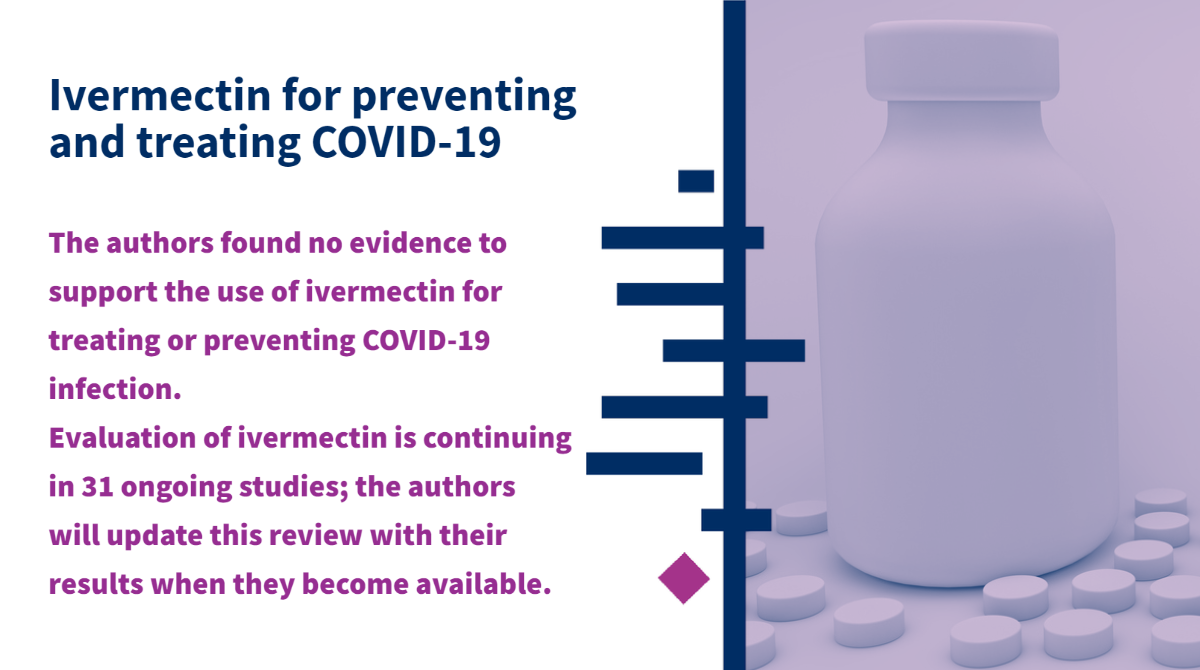
Is ivermectin effective for COVID-19?
Key messages
The authors of this Cochrane systematic review, published today by Cochrane Infectious Diseases Group, found no evidence to support the use of ivermectin for treating or preventing COVID-19 infection, but the evidence base is limited.
Evaluation of ivermectin is continuing in 31 ongoing studies; the authors will update this review with their results when they become available.
Main authors of the review, Maria Popp and Stephanie Weibel said: “The lack of good quality evidence on efficacy and safety of ivermectin arises from a study pool that consists mainly of small, insufficiently powered RCTs with overall limited quality regarding study design, conduct, and reporting. Current evidence does not support using ivermectin for treating or preventing of COVID-19 unless they are part of well-designed randomized trials.”

What is ivermectin?
Ivermectin is a medicine used to treat parasites such as intestinal parasites in animals and scabies in humans. It is cheap and is widely used in regions of the world where parasitic infestations are common. It has few unwanted effects.
Tests in the laboratory show ivermectin can slow the reproduction of the COVID-19 (SARS-CoV-2) virus but such effects would need major doses in humans.
Medical regulators have not approved ivermectin for COVID-19. It should only be used as part of well-designed studies (called randomized controlled trials) evaluating potential effects.
What did the authors want to find out?
They wanted to know if ivermectin reduces death, illness, and length of infection in people with COVID-19, or if it is useful in prevention of the disease. They included studies comparing the medicine to placebo (dummy treatment), no treatment, usual care, or treatments for COVID-19 that are known to work to some extent, such as remdesivir or dexamethasone. They excluded studies that compared ivermectin to other drugs that do not work, such as hydroxychloroquine, or that are not known to be effective against COVID-19.
They evaluated the effects of ivermectin in infected people on:
- people dying;
- whether people's COVID-19 symptoms got better or worse;
- unwanted effects;
- hospital admission or time in hospital;
- viral clearance.
For prevention, they sought the effect on preventing COVID-19 and SARS-CoV-2 infection.
What did they do?
The authors searched for randomized controlled trials that investigated ivermectin to prevent or treat COVID-19 in humans. People being treated with ivermectin had to have laboratory-test confirmed COVID-19 and be receiving treatment in hospital or as outpatients.
They compared and summarized the results of the studies and rated our confidence in the evidence, based on common criteria as to how reliable the evidence is.
What did they find?
The authors found 14 studies with 1678 participants that investigated ivermectin compared to no treatment, placebo, or usual care.
For treatment, there were nine studies of people with moderate COVID-19 in hospital and four of outpatients with mild COVID-19. The studies used different doses of ivermectin and different durations of treatment.
One study investigated ivermectin to prevent COVID-19.
They also found 31 ongoing studies, and there are 18 studies still requiring clarification from the authors or not yet published.
Listen to the evidence explained in this podcast
Main results
Treating people in hospital with COVID-19
The authors don't know whether ivermectin compared with placebo or usual care, 28 days after treatment:
- leads to more or fewer deaths (2 studies, 185 people);
- worsens or improves patients' condition assessed by need for ventilation (2 studies, 185 people) or oxygen (1 study, 45 people);
- increases or reduces unwanted events (1 study, 152 people).
Seven days after treatment, we don't know if ivermectin:
- increases or reduces negative COVID-19 tests (2 studies, 159 people).
Ivermectin compared to placebo or usual care may make little or no difference to improving patients' condition 28 days after treatment (1 study, 73 people) or to length of hospital stay (1 study, 45 people).
Treating outpatients with COVID-19
The author team don't know whether ivermectin compared with placebo or usual care:
- leads to more or fewer deaths 28 days after treatment (2 studies, 422 people);
- worsens or improves patients' condition 14 days after treatment assessed by need for ventilation (1 study, 398 people);
- increases or reduces negative COVID-19 tests seven days after treatment (1 study, 24 people).
Ivermectin compared to placebo or usual care may make little or no difference to improving outpatients' condition 14 days after treatment (1 study, 398 people) or to the number of unwanted events 28 days after treatment (2 studies, 422 people).
No studies looked at hospital admissions in outpatients.
Preventing COVID-19
The authors don't know whether ivermectin leads to more or fewer deaths compared with no drug (1 study, 304 people); no participant died 28 days after the drug. This study reported results for development of COVID-19 symptoms (but not confirmed SARS-CoV-2 infection) and unwanted events, but in a way that we could not include in our analyses. This study did not look at hospital admissions.

Main results explained
Main authors of the review, Maria Popp and Stephanie Weibel said: “The lack of good quality evidence on efficacy and safety of ivermectin arises from a study pool that consists mainly of small, insufficiently powered RCTs with overall limited quality regarding study design, conduct, and reporting. Current evidence does not support using ivermectin for treating or preventing of COVID-19 unless they are part of well-designed randomized trials.”
What are the limitations of the evidence?
Confidence in the evidence is very low because the authors could only include 14 studies with few participants and few events, such as deaths or need for ventilation. The methods differed between studies, and they did not report everything they were interested in, such as quality of life.
How up to date is this evidence?
The evidence is up to date to 26 May 2021.
What’s next?
Evaluation of ivermectin is continuing in 31 ongoing studies; the authors will update this review with their results when they become available.

